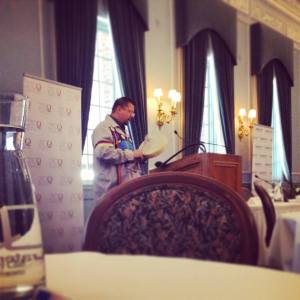By Misha Munim, J.D./M.A. Candidate at the University of Ottawa Faculty of Law and Norman Paterson School of International Affairs.
Launching a Global Think Tank
The Institute for 21st Century Questions held its official launch conference this past weekend at the University of Toronto. This global security think tank pioneered by Irvin Studin (author of The Strategic Constitution: Understanding Canadian Power in the World) and Sam Sasan Shoamanesh (Senior Special Assistant to the Prosecutor of the International Criminal Court) aims to analyze and help provide solutions to some of the major geopolitical, political and social questions of this new century.
The two-day conference was packed with stimulating presentations in both official Canadian languages of English and French, with equally engaging Q&A sessions that followed. Just a few of the names on the distinguished list of speakers included John E. McLaughlin, former director of the CIA; Fatou Bensouda, current Prosecutor of the ICC; Miloud Chennoufi, Professor at the Canadian Forces College; and Jon Finer, Deputy Chief of Staff at the United States Secretary of State.
One of my favourite things about the conference was that it commenced with an Aboriginal prayer followed by a traditional song, which highlighted the importance of First Nations’ interests in Canada’s security framework. I’ve attended many, many intelligence and security-related conferences and this was the first one in which I witnessed acknowledgement and tribute to the Aboriginal peoples of Canada. This is an area that surely deserves more attention from our national security community. If interested in further reading on the topic, Studin does a great job of addressing First Nations’ interests in light of Canada’s national and international security priorities in his book.
Harnessing Local Narratives in Strategic Solution-Finding
The conference was split into sessions of regional discussions, emphasizing the idea that there is no global narrative for framing the security environment for the next decade. Rather, narratives ought to be local. This, particularly, is what distinguished this conference from other security discussion forums. Rather than taking a Canadian-centric approach, I21CQ – not only the launch conference but the think tank itself – incorporates local dialogues from various parts of the globe. So, the panel on the Ukraine-Russia crisis was informed by academics who flew in from each of those countries. They observed the crisis as it unfolded first-hand and shared their insights with us. Similarly, the panel on the Middle East invited discussion by Professor Lerna Yanik from Istanbul, and Professor Chennoufi, who spent many years living in Algeria. This dialogue helped the audience learn a great deal from qualified experts who were able to analyze issues affecting the Middle East through a much closer lens, geographically.
The panel on Africa’s growth as a region was informed by Fatou Bensouda and Adama Dieng, who originally hail from the continent and currently work there. Both Dieng and Bensouda brought ideas to the table that helped us, as Canadians, recognize priorities that inform Africa’s security agenda. For instance, of importance to note is that security issues threatening western Africa, i.e. Ebola, may not be as relevant to southern Africa. As such, local narratives are key to paving the path towards solutions to security questions.
As Glen Greenwald rightly pointed out in his speaking engagement in Ottawa a few weeks ago, the discourse in Canada surrounding global security issues, is starkly contrasted with discourse in the Middle East on these very same issues. An example he used was that while Ottawa and Washington may deem Iran to be the biggest threat to security in the Middle East, Riyadh or Sana’a might, on the contrary, deem the United States and Israel to be the biggest security threats to the Middle East. The point is that there may not be a right or wrong view here. But the reality is that the ideas, views, discourse, and dialogues in different parts of the world are inevitably different.
Accordingly, what may be priority on Canada’s security agenda may not make the list for other countries and regions. This was also pointed out during a talk on ISIS in Ottawa this month. A foreign policy expert (Chatham House Rules) noted that while Canada has prioritized taking military air-strike action in the battle against ISIS, Germany has not. It’s not that Germany is not concerned with the ISIS threat, it’s just that the Ukraine-Russia crisis became a bigger priority given its closer geographic location in relation to Germany. So, understanding local narratives are vital to improving global security, by informing where resources can be allocated and how solution-finding initiatives can be implemented.
As Canadians, it’s important to question if we can present real solutions to international security problems without first understanding the local narratives surrounding these issues. This is exactly the opportunity that the I21CQ launch conference presented, and indeed it was an insightful one. We should stay tuned to the inquiries and solutions this strategic think tank formulates in the near future.
Categories: Uncategorized

